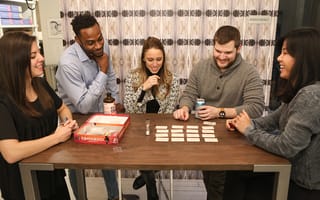Stride Consulting’s entire business model is built on collaboration: its full-stack developer consultants are paired with tech teams at businesses — including Plated and Codecademy, among many other notables — to assist and mentor in the name of making companies better.
So, it’s without any surprise that this collaborative vibe trickles down to how Striders work with each other to tackle any issue of the day (tech or otherwise) that they’re facing.
We spoke with Stride’s engineering team about how they’re on the front lines of solving tech issues for some of the most innovative businesses in the world.



FOUNDED: 2014
EMPLOYEES: 71
WHAT THEY DO: The agile software consultancy embeds seasoned full-stack consultants with tech teams – like Codecademy, Stash Invest, Plated and many others – allowing those teams to become the best versions of themselves.
WHERE THEY DO IT: Their offices are nestled between Chelsea and Flatiron.
SIDE HUSTLE: Stride pays for one to two weeks off for Strider’s to learn something new or attend a conference, as well as an additional $2,000 for expenses. Employees are also paid for working on open source projects, creating podcasts, blogging or any content-related project.
IDEAL CANDIDATE: A Stride team member is eager to learn, open to new ideas and embodies the Stride values: humility, respect, willingness to help others, honesty and the ability to learn from failure.


Kelly Wu, Principal Developer
As principal developer, Kelly works on strategic initiatives to support consultants, her work ranging from working with recruiting on Stride’s hiring process to attending to client’s technical needs. In short, she’s working toward making sure engineers achieve their short-, medium- and long-term goals.
BEYOND WORK: Kelly recently started powerlifting, an activity that she says has made her a better leader by slowing down and focusing.
What initially attracted you to your role at Stride?
Stride’s dedication toward maintaining a positive, collaborative and open culture is what attracted me. Culture is one of the most important aspects for me in a job, and Stride’s truly embodies their company values. As for the role, it was unique and different from a lot of other engineering leadership roles out there, and I was interested in the challenge.
What values are held on this team?
All the Stride values are as follows: humility, respect, willingness to help others, honesty and the ability to learn from failure. During our company meetings, we have a tradition of doing “toasts to failures.” People volunteer to tell an anecdote about a recent experience, where they “failed.” The stories range from funny to shocking to touching, but there is never any judgment cast on the presenter and we all learn from it.
Everyone strives to improve the teams, product and companies they work with — and also focuses on improving as an engineer.”
How is the team different from any other that you’ve been on?
Everyone is passionate and wants to make a positive impact. It’s not just a job where people clock in hours for a paycheck. Everyone strives to improve the teams, product and companies they work with — and also focuses on improving as an engineer.


Arielle Sullivan, Software Developer
A new member of the Stride team, Arielle joins client teams to help them deliver high-quality code.
BEYOND WORK: It’s the most wonderful time of the year for Arielle, as the winter time brings ice skating — one of her favorite activities — outside.
As someone who’s relatively new to the team, what was your first impression of the culture, and how has it measured up since?
Stride has an open and collaborative vibe. Spontaneous pairing sessions or discussions on how to train each other in a new technology are a natural outcome from this group of people. Stride has true friendships, so it is a place where asking for or offering help is easy. In my first week at Stride, a bunch of us were at the office and a comment about how a process could be easier snowballed into us building an internal app for Stride. Productivity like that happens when people care about the team’s success as much as their own.
Stride has true friendships, so it is a place where asking for or offering help is easy.”
What initially attracted you to your current role at Stride?
I wanted to push my limits technically, but I also wanted to spend time growing leadership qualities and thinking critically about how successful teams work, and Stride offers the opportunity to focus on both. I work on interesting, often new technical challenges, but I’m also responsible for bringing a fresh perspective to optimizing a team’s practices and environment.
Stride stood out among other consultancies. I’m a people person, and it's important for me to get to know team members and how they think before weighing in on a project. I liked that Stride's strategy is about showing up with questions, not answers.
Tell us about a project or challenge you’re working on that excites you the most.
I'm learning how to design data models for an NoSQL database for different use cases. This spring, we need a query that wasn’t supported by the current schema, so a few of us took some time to brainstorm and outline our options. I've had to double down on my understanding of relational databases in order to wrap my head around NoSQL. It's been a win for my understanding of how to make informed data storage decisions, and a win for the team — the next query is going to be a piece of cake.


Mike Silvi, Lead Software Developer
Silvi — as he’s called by his coworkers and friends — wears many hats at Stride, from working to build a successful engagement team to ensuring that team has a coherent strategy, among many other responsibilities.
BEYOND WORK: Mike is a world traveler, which has taught him that nothing goes as planned — like when he was skiing with his girlfriend in France, and she tore her ACL. He had to seek medical help through charades to deal with the language barrier.
What is the breakdown of a developer’s day?
It varies by engagement. We embed by co-locating with our clients, educate through practice and transform by focusing on creating a positive impact for client teams and client users that persists after we leave. Our day often starts in a coffee shop with other Striders on the engagement, where we discuss how we can use the day to not only deliver value through feature delivery but also coach on technical practices and agile process.
When we’re at a client’s office, we’re likely pairing either with each other or with client developers. Otherwise, we're coaching or participating in client meetings, but our goal is to make those meetings as efficient as possible so we can spend most of our time writing code.
What opportunities are there to work on different products, features or tech stacks?
Every six to 12 months, you’ll find yourself working on a new product next to different Striders at a different client, possibly using different technologies and varied approaches. I’ve had the opportunity to work with on-prem, hybrid and cloud-native AWS, GCP and Azure. Applications I've worked on have used Java (Spring, Dropwizard), Python, Angular, React, PubSub, Rabbit, Kafka or REST.
I’ve worked with a financial exchange with complex trades, video streaming to millions of concurrent users and data engineering with an entire organization’s digital subscription data. I’ve been at startups where the entire engineering team was six people and at large enterprises with hundreds of engineers; I’ve learned about different process problem sets that emerge from scaling teams and organizations. I’ve been on clients as a developer consultant, but also as the right-hand person for a CTO’s transformation.
Every six to 12 months, you’ll find yourself working on a new product next to different Striders at a different client, possibly using different technologies and varied approaches.”
What about Stride or your work inspires you?
The people at Stride inspire me. I’ve never worked at a company with so many great people, many of whom have become my friends. The culture is truly collaborative: We don’t just talk about collaborating — we mob or pair on almost every problem we face.
Many of our consultants have some form of teaching in their background and it shows. You’ll find safe environments where you can ask for help and offer help to others. A core value of Stride’s is humility, and you won’t find jerks, pontificators, or “well-actually’s” here. It’s a company of people who care about finding better ways of working and sharing what they’ve learned.





